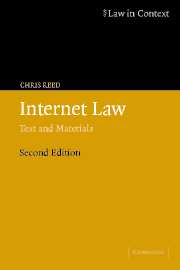Book contents
- Frontmatter
- Contents
- Preface
- Table of UK Statues
- Table of statutes–foreign jurisdictions
- Table of European Communities legislation
- Table of Conventions and Agreements
- Table of cases
- Introduction
- 1 The Internet as a distributed environment
- 2 From each according to his ability : actors and activities in the Internet world
- 3 An infinity of scarce resources : ownership and use of Internet resources
- 4 New actors on a new stage : intermediary liability in the Internet world
- 5 On the Internet, nobody knows you're a dog: identity and identification
- 6 Old wine in new bottles : traditional transactions in the Internet environment
- 7 The long arm of the law : cross-border law and jurisdiction
- 8 Legislative and regulatory arbitrage
- 9 Enforceability in the Internet environment
- 10 Facing the legislative and regulatory challenge
- Index
3 - An infinity of scarce resources : ownership and use of Internet resources
Published online by Cambridge University Press: 05 June 2012
- Frontmatter
- Contents
- Preface
- Table of UK Statues
- Table of statutes–foreign jurisdictions
- Table of European Communities legislation
- Table of Conventions and Agreements
- Table of cases
- Introduction
- 1 The Internet as a distributed environment
- 2 From each according to his ability : actors and activities in the Internet world
- 3 An infinity of scarce resources : ownership and use of Internet resources
- 4 New actors on a new stage : intermediary liability in the Internet world
- 5 On the Internet, nobody knows you're a dog: identity and identification
- 6 Old wine in new bottles : traditional transactions in the Internet environment
- 7 The long arm of the law : cross-border law and jurisdiction
- 8 Legislative and regulatory arbitrage
- 9 Enforceability in the Internet environment
- 10 Facing the legislative and regulatory challenge
- Index
Summary
Exploring the paradox
The Internet is almost certainly the largest information resource which has ever existed. In theory, there is no limit to its growth. Of course, it will always in fact be finite, but on the scale of human usage it may in practice be treated as potentially infinite. This is true both of the network itself, and of the information resources available via that network.
To take a simple example, accessing a server via the Internet requires one to know its IP address. This is expressed as four binary numbers, each of eight bits (four octets). In theory, therefore, the maximum number of servers which can be connected to the Internet is 232 or in decimal notation 4,294,967,296. To put this in context, the current population of the world is estimated at just over six billion, so that there are probably enough potential IP addresses to allow every adult to run his or her own server. But if this number of potential servers becomes insufficient, each person (including children) in the estimated world population of around 9.5 billion in 2050 could be allocated over 100 IP addresses by modifying the address format to five octets.
Internet users will know that server addresses are identified to humans by domain names. These are expressed in alphanumeric form (eg ccls.edu), and a computer known as a Domain Name Server matches these names to the numerical IP addresses.
- Type
- Chapter
- Information
- Internet LawText and Materials, pp. 40 - 88Publisher: Cambridge University PressPrint publication year: 2004

